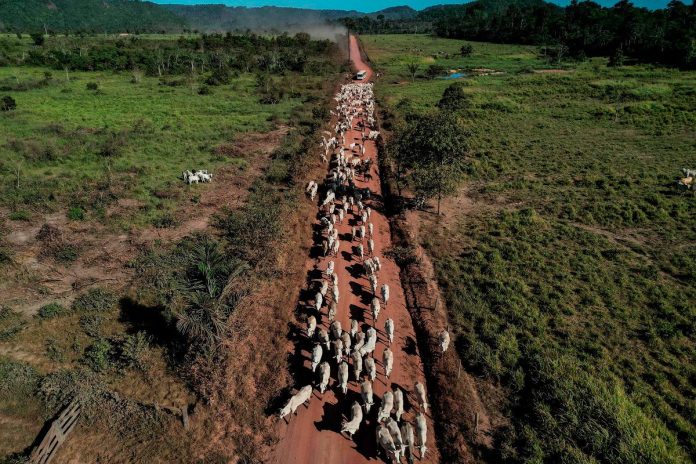SAO FELIX DO XINGU: Ranchers in the Brazilian Amazon use a cheap worker nicknamed Red John to clear their pastures with fire.
This practice leaves behind blackened earth and charred trees while threatening the planet’s largest tropical forest.
Fire is so deeply embedded in local ranching culture that abandoning it seems almost unthinkable for landowners.
Antonio Carlos Batista, who owns 900 head of cattle in Sao Felix do Xingu, explained that fire remains the most affordable land management tool.
“Fire is a cheap way to maintain pasture,“ Batista told AFP.
Locals humorously refer to setting fires as hiring the worker Red John when they go out with gasoline and matches.
The uncontrollable nature of fire became devastatingly clear during 2024’s unprecedented drought linked to climate change.
Fires blazed out of control across nearly 18 million hectares of the Brazilian Amazon that year.
This massive burning caused deforestation to rise four percent in the twelve months leading to July.
President Luiz Inacio Lula da Silva suffered a setback in his pledge to eradicate deforestation by 2030.
For the first time, more tropical forest burned than grassland during the fire season.
Most fires originated on cattle ranches before spreading through dry vegetation into forested areas.
Sao Felix do Xingu recorded Brazil’s highest number of fire outbreaks with more than 7,000 incidents.
Environment Minister Marina Silva identified fire-driven deforestation as the Amazon’s current big challenge.
Experts say solving this crisis requires firefighters, stricter sanctions, and a fundamental cultural shift.
Sao Felix lies in Para state, which will host the COP30 UN climate conference in November.
The municipality contains Brazil’s largest cattle herd with 2.5 million head, partly for export.
Sao Felix also leads Brazil in carbon dioxide emissions from deforestation according to 2023 data.
The area gained international notoriety during 2019’s “Fire Day” when landowners deliberately set blazes.
Vast deforested expanses now stretch along miles of dusty roads through the region.
Many large ranches maintain anonymous operations with headquarters in distant cities like Sao Paulo.
The Bom Jardim ranch houses 12,000 cattle behind only a wooden fence as identification.
Foreman Gleyson Carvalho acknowledges the increasing risks of using fire despite its benefits.
Burned vegetation acts as natural fertilizer that enriches soil and stimulates grass growth.
Last year’s uncontrolled fires devoured everything on the Bom Jardim property according to Carvalho.
Cattle lost significant weight and the ranch fought hard to prevent animal deaths during the crisis.
Satellite data shows more than two-thirds of the Bom Jardim ranch burned during the fires.
The property belongs to former Sao Felix mayor Joao Cleber, repeatedly fined for environmental crimes.
The ranch borders a Kayapo Indigenous village whose residents suffered from toxic smoke clouds.
Village school teacher Maria de Fatima Barbosa described nights when everything smelled of smoke.
A 2021 Greenpeace report links the ranch to Brazilian meatpacking giants Frigol and JBS.
Small-scale rancher Jose Juliao do Nascimento expressed sadness at seeing green regions destroyed by fire.
He represents many farmers who migrated to the Amazon during the military regime’s colonization push.
The regime’s slogan promised “a land without men for men without land” to encourage settlement.
Last year’s flames reached Nascimento’s pasture and brought terrified cows from other properties.
Although Para state banned pasture maintenance fires, enforcement remains weak across the region.
WhatsApp messages quickly alert landowners about approaching police or environmental officials.
Ibama president Rodrigo Agostinho reported that officials face threats when issuing fines.
Small farmer Dalmi Pereira expressed feeling powerless while large corporations thrive.
Agricultural giant Agro SB operates the massive Lagoa do Triunfo ranch complex in the region.
The company received six environmental fines since 2013 without paying any of them.
The property recorded more than 300 fires in 2024 according to AFP-analyzed data.
Agro SB received a “More Green Integrity” seal from Brazil’s agriculture ministry in 2024.
Pereira claims small farmers remain excluded while Agro SB receives preferential government treatment.
Land title disputes continue between small ranchers and Agro SB over usucapion claims.
Agro SB calls the ranchers invaders and blames them for starting fires on its property.
Traditional communities and small producers historically used fire for cultural practices.
Large farms now cause most tree loss followed by illegal miners according to Greenpeace’s Cristiane Mazzetti.
Sao Felix mayor Fabricio Batista emphasized the importance of land documentation for conservation.
He believes documented landowners will protect their heritage more carefully.
The mayor himself received a deforestation fine in 2014 that was later canceled on appeal.
Batista says Sao Felix needs more federal support since it lacks even a single fire brigade.
Farmer Regino Soares lost twenty percent of his animals in last year’s fires.
He advocates for better controlled burning practices with proper timing and firebreaks.
The Amazon currently experiences its lowest fire levels since record-keeping began in 1998.
Amazon Environmental Research Institute’s Ane Alencar credits climate and human factors.
Rainfall distribution improved this year with the Amazon in a neutral climate phase.
Greater authority oversight and producer caution after 2024’s trauma also contributed.
Ibama intensified Amazon surveillance since Lula returned to office after Bolsonaro’s hands-off approach.
Despite record deployments of firefighters and equipment, resources remain inadequate for the vast territory.
Finding and punishing individuals who light matches presents an enormous challenge for authorities.
Ibama now uses artificial intelligence to help identify responsible parties through satellite imagery.
Enforcing fines remains particularly difficult across the remote Amazon region.
Greenpeace revealed that most fines from 2019’s “Fire Day” went unpaid five years later.
Deforestation dropped seventy percent during Lula’s first terms through monitoring and control policies.
Journalist Joao Moreira Salles says successful public policy requires popular support above all.
He warns that Brazil fundamentally fails to properly see and understand its Amazon region. – AFP








